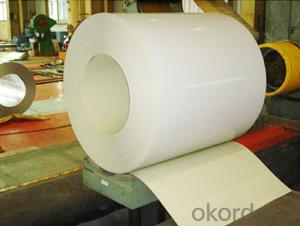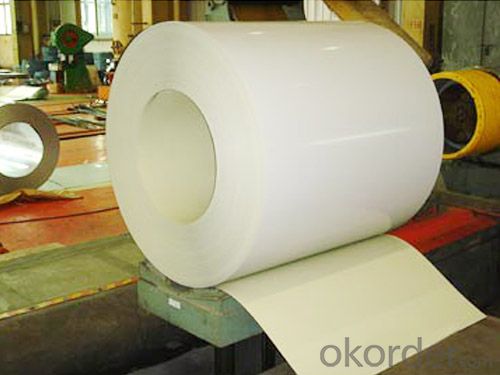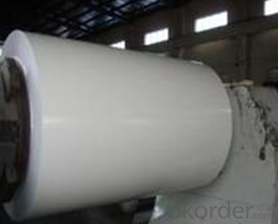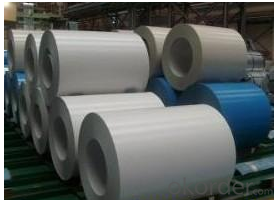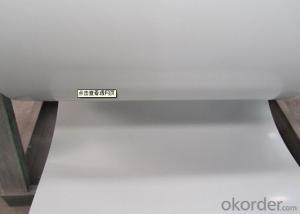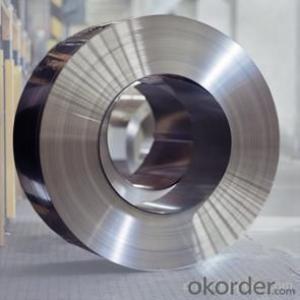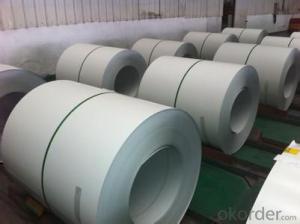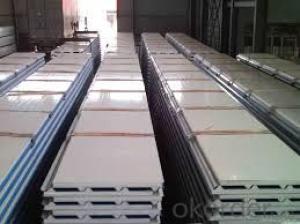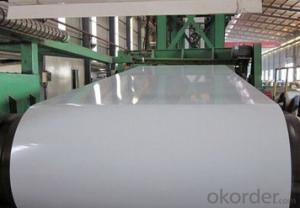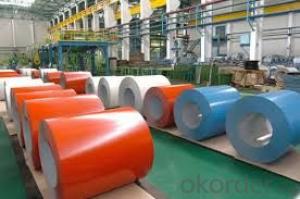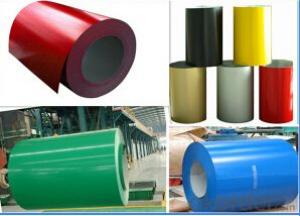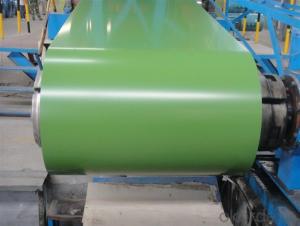Pre-Painted Galvanized Steel Coil (PPGI/PPGL) /White Color
- Loading Port:
- Shanghai
- Payment Terms:
- TT OR LC
- Min Order Qty:
- 100 m.t.
- Supply Capability:
- 10000 m.t./month
OKorder Service Pledge
OKorder Financial Service
You Might Also Like
1. Pre-Painted Galvanized/Aluzinc Steel Coil Description:
With GI as base material, after pretreatment (degrease and chemical treatment ) and liquid dope with several layers of color, then after firing and cooling, finally the plate steel is called pre-painted galvanized (aluzinc) steel. Pre-painted galvanized steel is good capable of decoration, molding, corrosion resistance. It generally displays superior workability, durability and weather resistance.
2.Main Features of the Pre-Painted Galvanized/Aluzinc Steel Coil:
• Excellent process capability
• Smooth and flat surface
• Workability, durability
• Excellent heat resistance performance
• High strength
• Good formability
• Good visual effect
3.Pre-Painted Galvanized/Aluzinc Steel Coil Images
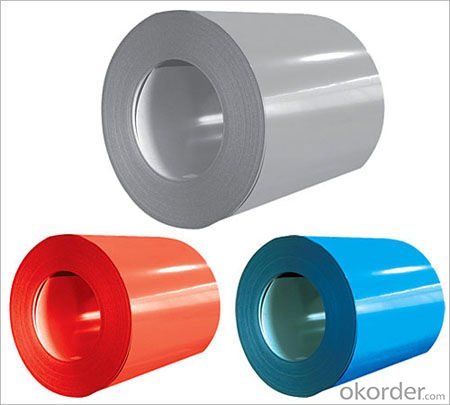
4.Pre-Painted Galvanized/Aluzinc Steel Coil Specification
Standard: AISI, ASTM, BS, DIN, GB, JIS
Grade: DX51D, DX52D
Thickness: 0.17-2.0mm
Brand Name: KMRLON
Model Number: coil
Type: Steel Coil
Technique: Cold Rolled
Surface Treatment: Coated
Application: Boiler Plate
Special Use: High-strength Steel Plate
Width: 20-1250mm
Length: customized
commoidty: pre-painted galvanized steel coil
Thickness: 0.13-4.0mm
width: 20-1250mm
zinc coating: 40-180g/m2
printing thickness: top side: 20+/-5 microns, back side: 5-7 microns
color: all RAL color
surface treatment: color coated
coil weight: 4-7 tons
coil ID: 508/610mm
packaging: standard seaworthy packing
5.FAQ of Pre-Painted Galvanized/Aluzinc Steel Coil
1. What’s the application of this product?
Roof, roof structure, surface sheet of balcony, frame of window, etc.
2. What’s the brand of the paint?
We use the best brand of all of the word—AKZO.
3. How to guarantee the quality of the products?
We have established the international advanced quality management system,every link from raw material to final product we have strict quality test;We resolutely put an end to unqualified products flowing into the market. At the same time, we will provide necessary follow-up service assurance.
4. How long can we receive the product after purchase?
Usually within thirty working days after receiving buyer’s advance payment or LC. We will arrange the factory manufacturing as soon as possible. The cargo readiness usually takes 15-25 days, but the shipment will depend on the vessel situation.
- Q: How do steel coils contribute to the manufacturing of agricultural machinery?
- The manufacturing of agricultural machinery heavily relies on steel coils, which play a vital role in this process. Typically, these coils are crafted from top-notch steel that possesses exceptional strength, durability, and resistance to corrosion. To begin with, agricultural machinery heavily relies on steel coils for the construction of its main structural components, including the chassis, frames, and supports. These components must endure heavy loads, extreme weather conditions, and rough terrains. Thanks to the strength and resilience of steel coils, the machinery can effectively handle these challenging environments and operate efficiently. In addition, steel coils find application in the production of various moving parts and mechanisms within agricultural machinery. For example, gears, shafts, and axles, which are crucial for power transmission and rotational motion transformation, are created using steel coils. The high tensile strength and excellent machinability of steel make it an ideal material for these essential components, ensuring their reliability and longevity. Moreover, steel coils contribute to the manufacturing of agricultural machinery by providing a protective layer against wear and tear. Often, these coils are coated with specialized finishes or paints to enhance their resistance to rust, chemicals, and abrasion. This protective layer significantly prolongs the machinery's lifespan, reduces the need for frequent maintenance and repairs, and ultimately increases its overall efficiency and productivity. Furthermore, the versatility of steel coils allows for customization and adaptation to meet the specific requirements of agricultural machinery. Manufacturers can shape and mold the coils into different sizes and dimensions, enabling the production of machinery suitable for various farming practices and applications. Whether it's tractors, harvesters, or irrigation systems, steel coils are crucial for creating versatile and dependable agricultural machinery. In conclusion, steel coils are essential in the manufacturing of agricultural machinery due to their strength, durability, resistance to corrosion, and customization capabilities. From structural components to moving parts and protective coatings, steel coils greatly contribute to the efficiency, reliability, and longevity of agricultural machinery, thus providing significant support to the global agricultural industry.
- Q: What are the common coil surface finish standards?
- The common coil surface finish standards include mill finish, brushed finish, mirror finish, and embossed finish.
- Q: I bought a damascus steel knife. It will be used for display. Nothing like hunting/skinning. If It is just sitting around, will it rust? (assuming that it isn't getting wet) Thanks for the help.
- Modern okorder /... Whether it will rust or not depends on humidity in your area and steel's own stainlessness. Although, if it's just for the display chances are very little, unless humidity in your area is close to tropical rain-forest. Natural oils do prevent rust, but they degrade with time. You'll be much better off using tuf-cloth or something similar. I've had plain carbon steel knives protected with Tuf-cloth for years, no sign of rust.
- Q: This is my first time buying new strings for my violin and I’ve narrowed it down to two choice based on reviews and cost. The only difference I can see between the strings is that one has a solid steel core and the other has a synthetic core. What are the pros and cons of each type of core?
- It depends on the tone you want. Synthetics are a more artificial, but rich tone. Solid steel strings will have a beautiful and bright tone, but may be a tad bit more difficult to play.
- Q: I am wondering if i can use my western guitar as a kind of steel-guitar, read something about it on Wikipedia.
- Musical style speaks volumes while it includes this concern. people who % severe quantity would be unhappy with unamplified nylon string guitars. From my attitude, the common distinction between metallic and nylon is this: metallic strings ring and nylon strings resonate. the quantity produced by employing metallic is frequently plenty greater suitable than nylon yet, to my way of thinking, the sound resonance produced by employing the wood of your guitar is largely masked by employing metallic strings. in case you have a decently made guitar (frequently, around 1000 money and up), the sound interaction between the wood and the strings in a nylon guitar is magical around the completed frequency selection. With a metallic string guitar, the sound produced by employing the vibrating string overpowers the wood resonance in any respect yet low frequencies. in my view, i will take a nylon string guitar any day for the sensitivity gained from the interaction between wood and vibrating string.
- Q: What are the different types of steel finishes available for coils?
- There are several types of steel finishes available for coils, including hot rolled, cold rolled, galvanized, and coated finishes.
- Q: How are steel coils used in the production of doors and windows?
- The strength and versatility of steel coils make them crucial in the manufacturing process of doors and windows. Typically made from high-quality steel, these coils have various applications. To begin with, steel coils are utilized in the creation of door and window frames. When unrolled, they are cut into specific lengths to match the desired dimensions of the frame. The steel is then bent and shaped into the required design, ensuring durability and strength. Furthermore, the coils are employed in producing the panels or glass holders for doors and windows. The steel is cut and formed into the desired shape, and then either welded or attached to the frame. This guarantees a sturdy structure capable of withstanding the weight and pressure of the glass or panels. In addition, steel coils are also used for manufacturing hinges and other hardware components. By cutting and shaping the coils, the necessary parts are created, ensuring sufficient strength to support the movement and functionality of the doors and windows. Moreover, steel coils serve decorative purposes as well. They can undergo embossing or be coated with different finishes, enhancing the appearance of doors and windows. This vast range of design options enables manufacturers to create products that cater to various architectural styles and individual preferences. In essence, steel coils play a pivotal role in the production of doors and windows. From creating frames, panels, hinges, and hardware components to offering customization and aesthetic appeal, their importance cannot be overstated.
- Q: What are the different types of steel coil edges?
- There are several different types of steel coil edges, each with its own unique characteristics and applications. 1. Mill Edge: This is the most common type of steel coil edge. It is produced by cutting the coil at the mill and does not undergo any additional processing or treatment. Mill edge coils have a natural, slightly rounded edge, which makes them suitable for a wide range of applications. 2. Slit Edge: Slit edge coils are created by cutting the coil along its width using a slitting machine. This process results in a straight and smooth edge, making them ideal for applications that require precise measurements, such as automotive parts or electrical components. 3. Deburred Edge: Deburred edge coils have undergone an additional process to remove any burrs or sharp edges that may be present after slitting. This makes them safer to handle and reduces the risk of damage during fabrication or installation. Deburred edge coils are commonly used in the construction industry, especially for structural steel components. 4. Rounded Edge: As the name suggests, rounded edge coils have a rounded edge profile. This type of edge is achieved through a specific rolling process that creates a smooth and curved edge. Rounded edge coils are often used in applications where safety is a concern, such as in the manufacturing of household appliances or kitchen equipment. 5. Sheared Edge: Sheared edge coils are produced by cutting the coil with shearing blades, resulting in a straight edge with a slight burr. While sheared edge coils may have a rougher finish compared to other types of edges, they are still commonly used in applications that do not require a high level of precision, such as general fabrication or shelving. Overall, the choice of steel coil edge depends on the specific requirements of the application, including factors such as measurement precision, safety considerations, and aesthetic preferences.
- Q: What are the different coil cutting machine options available for steel coils?
- There are several coil cutting machine options available for steel coils, including slitting machines, cut-to-length machines, and blanking machines. Slitting machines are used to cut the steel coils into narrower strips, while cut-to-length machines are designed to cut the coils into specific lengths. Blanking machines, on the other hand, are used to cut the steel coils into various shapes and sizes. These coil cutting machines offer different capabilities and can be chosen based on the specific requirements of the steel coil cutting process.
- Q: Ive been playing with my ping i3 graphite irons for 6 years now and some days i can hit it and some days i cant. Then i tried out my friends irons the other day and he had steel and i was hitting the ball anywhere i wanted it to go..Is that a fluke or is steel irons just better than shaft? I was thinking about trading my graphites for steel, is that a good idea??
- Ping Graphite Iron Shafts
Send your message to us
Pre-Painted Galvanized Steel Coil (PPGI/PPGL) /White Color
- Loading Port:
- Shanghai
- Payment Terms:
- TT OR LC
- Min Order Qty:
- 100 m.t.
- Supply Capability:
- 10000 m.t./month
OKorder Service Pledge
OKorder Financial Service
Similar products
Hot products
Hot Searches
Related keywords
